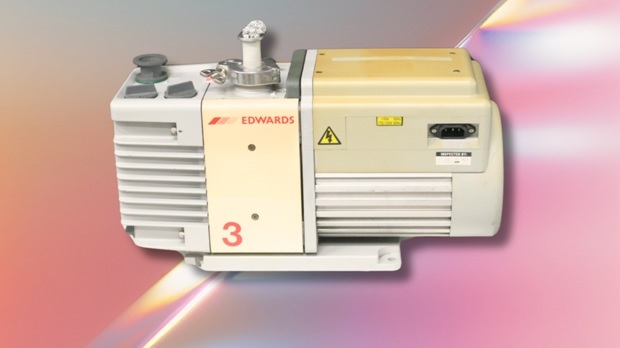Choosing the Right Vacuum Pumps for Your Laboratory
22nd Oct 2024

When running a reliable chemistry laboratory, vacuum pumps are essential tools. Whether you're a researcher isolating DNA, a scientist running an electron microscope, or a technician distilling volatile compounds, having the right vacuum system can make all the difference. The challenge? With so many options, finding the perfect one can feel like sifting through a vacuum. Let’s dive into how we can help you pick the right system for your needs, focusing on various types of vacuum pumps to help optimize your lab's processes.
Understanding the Basics
Before we get into the details of specific pumps, let’s break down the fundamentals. Vacuum pumps remove gas molecules from a sealed space, creating a partial or complete vacuum.
In laboratories, this vacuum is crucial for reducing contamination, lowering boiling points in distillation, or allowing precise control of reactions in low-pressure environments. From Edwards vacuum pumps to rotary vane vacuum pumps, each type has its own set of advantages tailored to different applications.
Rotary Vane Vacuum Pumps
Let’s start with one of the most commonly used systems in laboratory settings—the rotary vane vacuum pump. These pumps are the workhorses of many labs, known for their high flow rates and the ability to create fairly low-pressure environments.
We offer systems like the Edwards Rotary Vane Vacuum Pump and the DuoSeal 1402 Welch Vacuum Pump. These pumps are particularly useful for applications such as vacuum distillation, freeze drying, and even space research!
Suppose you're looking for an affordable alternative for researchers and scientists. In that case, rotary vane vacuum pumps like the DuoSeal offer great vapor handling capabilities, ensuring that your lab’s processes run smoothly without constant maintenance.
Diaphragm Vacuum Pumps
Next up are diaphragm vacuum pumps. These pumps are oil-free, which means they're perfect for applications where contamination could ruin your results.
They're quiet, low-maintenance, and best suited for applications like filtration or solvent recovery in pharmaceutical or environmental labs. Since they require no oil, diaphragm vacuum pumps reduce the risks of cross-contamination or oil misting—making them a "clean" choice for many.
For instance, in biotech labs, these pumps are key for isolating sensitive samples like RNA or proteins. The oil-free operation of these pumps also makes them ideal for educational laboratories where ease of use and low-maintenance equipment is a priority. When you need a pump that is reliable and environmentally friendly, a diaphragm vacuum pump could be the star of your lab.
Diffusion Vacuum Pumps
Need something a bit more sophisticated? Enter the diffusion vacuum pump. This pump is often used in high-vacuum applications where ultra-low pressures are necessary—think electron microscopy or thin film deposition in semiconductor research.
The diffusion vacuum pump works by creating molecular drag to pull gases out of the vacuum chamber, which can achieve pressures as low as 10^-10 Torr. While they’re incredibly efficient, they require a backing pump (usually a rotary vane pump) to initiate the vacuum. Sure, they might be a bit noisier and require some heat management, but they’re indispensable when you need a serious vacuum.
If you work in fields that demand precision, these pumps are the ideal choice. Their high-speed performance makes them a critical piece of equipment in laboratories requiring high-vacuum conditions.
Making the Right Choice for Your Lab
Every lab is unique, and so are your needs. Choosing between Edwards vacuum pumps, diaphragm vacuum pumps, or rotary vane vacuum pumps requires considering a few important factors:
- Vacuum level: Do you need a high vacuum (as in electron microscopy) or a medium vacuum (for general lab applications)?
- Flow rate: How much gas do you need to evacuate from your system?
- Contamination concerns: For sensitive operations like biotechnology, oil-free pumps are usually preferable.
- Noise and maintenance: Consider the environment. For educational labs or quiet research facilities, noise levels might matter.
Of course, the guide to chemistry laboratory equipment suggests that understanding your specific requirements will lead you to the most effective vacuum pump for your tasks. Whether it’s a quiet diaphragm vacuum pump for your chemistry class or a robust Edwards vacuum pump for industrial applications, the right choice can boost productivity and ensure accurate results in your lab.
Top Picks from Our Inventory
Here at HiTechTrader, we’ve got an excellent selection of vacuum pumps tailored to meet diverse needs:
- Edwards Model RV3 Rotary Vane Vacuum Pump: A perfect choice for various research and industrial applications, offering flexibility with its different speed settings.
- DuoSeal 1402 Welch Vacuum Pump: Known for durability and vapor-handling capability, this one’s perfect for vacuum furnace evacuation and more.
- SOGEVAC SV 40 BI Vacuum Pump: Featuring an ultimate pressure of 0.8 mbar, this pump is ideal for a wide range of general vacuum applications.
- Pfeiffer Vacuum Turbo Pump TMH-260: Need ultra-high vacuum conditions? This turbo pump is your go-to.
We understand that no two labs are the same, and whether you're on the lookout for a diffusion vacuum pump for your high-vacuum needs or a diaphragm vacuum pump to keep things simple and oil-free, we’ve got you covered.
Where to Go from Here?
Selecting the right vacuum pump doesn’t have to be daunting! Whether you're setting up a new lab or upgrading your current system, having the right pump will keep your operations running smoothly and your research results accurate. You can trust that our team at HighTechTrader will provide affordable alternatives for researchers and scientists as well as premium choices from well-known brands.
For more detailed specs and pricing on our wide array of laboratory equipment, check out our distributors of laboratory equipment section or speak with one of our experts today.
